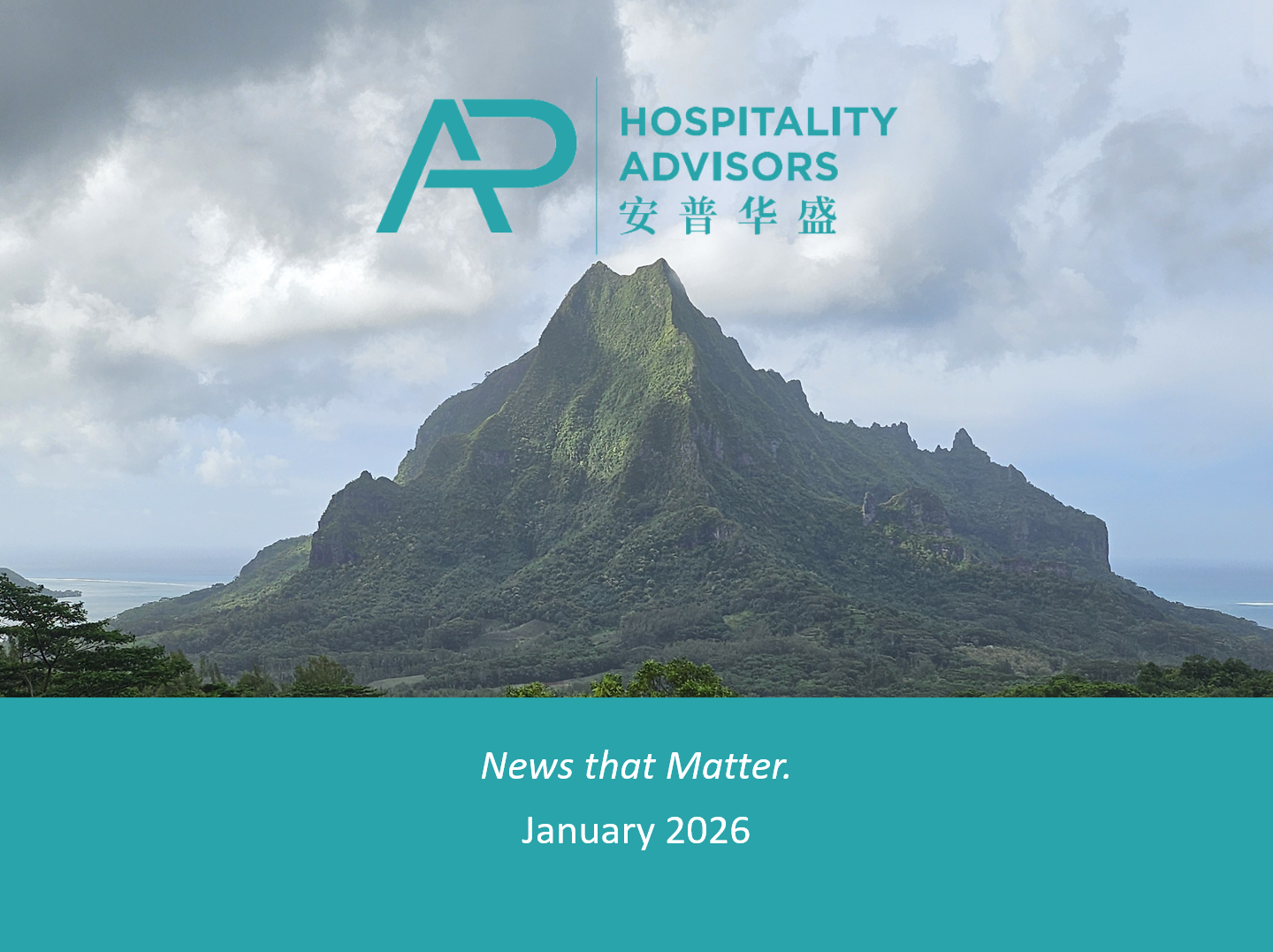AP COVID Hospitality Bulletin Asia Pacific - December 2021

Transactions that matter.
Hotel Q Station, Australia
- The leasehold of the historical Quarantine Station (Q Station) at Manly’s North Head was sold to local hotelier, Glenn Piper from Mawland Group, at a price short of AUD16 million. The Q Station currently has 105 hotel rooms managed by Accor, together with multiple F&B outlets and outdoor spaces. Mawland Group took over the lease in 2006 under National Parks and Wildlife Service and developed the hospitality business afterwards.
- Glenn Piper is also the owner of another historical hotel, the Harbord Hotel, in the area. After the acquisition of Harbord Hotel he transformed the site into a stylish pub and event venue. The lease of the Q Station runs until 2051; although Piper hasn’t announced his plans for Q Station, he is expected to enhance the site in the future.
Update: Butterfly on Prat, Hong Kong
- The buyer of Butterfly on Prat in Hong Kong was revealed to be US fund manager Hines in partnership with Hong Kong-based real estate and technology investors MindWorks Properties. Hines announced that the property would undergo a conversion from hotel to co-living and become Dash Living on Prat with a retail component on the ground floor. Dash Living is a Hong Kong-based co-living concept backed by MindWorks who expanded its regional presence through collaborations with Ovolo and The Ascott in 2021.
- Earlier this year, Dash Living led at least two conversion projects from hotel to co-living assets in Hong Kong. The Aberdeen by Dash Living was converted from Mojo Nomad By Ovolo and targets the resident long-stay market while the border remains closed. On the other hand, the newly launched location in Kowloon, Dash Living on Tung Fong, was previously a budget hotel operated by a local group.
- Hong Kong’s co-living market is evolving and entering a new era since 2020. The co-living market in Hong Kong sees diverse demand from students, young professional, and even small families. The other co-living market leader, Weave Living, also set eyes on expanding in Hong Kong. Beyond the deal covered in the AP newsletter back in August, 18 Sung Wong Toi Road in Kowloon, Weave Living also took over a residential building managed by Shama located in Mid-Levels in March of 2021.
Update: Hotel conversion in Korea
Starting from the end of 2020, several hotels announced temporary or permanent closure due to the decrease in international travelers. Additionally, landmark hotels in Seoul were sold and are scheduled for repurposing. Here is an update on scheduled hotel repurposing projects across Korea.
- The 341-key Sheraton Seoul Palace Gangnam is the first five-star property closing its door after the sale at the end of 2020. Considering the prime location of the property, it is likely to be renovated into prime residences as reported by local media.
- Hyundai Engineering & Construction Co. purchased the 336-key Le Meridien Seoul in the beginning of 2021 where a residential or mixed-use conversion is expected in the coming years. The hotel previously was rebranded from The Ritz-Carlton Seoul in 2017.
- The sale of the 260-key Sheraton Seoul D Cube City Hotel was finalized in November. The new owner, Singapore-based Keppel Investment Management, is going to transform the building into office and co-working spaces in conjunction with existing office space in the complex which Keppel invested in earlier this year.
- The latest hotel transaction in Seoul, Millennium Hilton Seoul, is another upcoming conversion project in Seoul. The new owner, IGIS, plans to redevelop the hotel into a complex building with offices, a hotel and retail. IGIS has gradually been building a small portfolio proximate to Seoul Station together with Namsan Square and Daewoo Foundation Building.
- Other parts of Korea are not immune to hotel conversions. The 527-key Golden Tulip Busan is set to be repurposed into a high-end residential project in 2022.

COVID news that matter.
While most countries are getting more people fully vaccinated, some countries have started to roll out booster shots for their at-high-risk population - we added a column in the vaccination leadership board below. The latest variant reported by WHO, Omicron, poses concerns for the reopening of countries in Asia Pacific. Japan, who planned to further ease entry requirements, announced that no foreign visitors would be permitted until further notice. Other regions, like Hong Kong, The Philippines, and Cambodia also restricted entry from high-risk countries.

Singapore
- Singapore has the third highest rate of fully-vaccinated residents in the world while it is gradually reopening its border to foreign visitors via vaccinated travel lanes (VTLs) which facilitate quarantine-free travel between two countries. By the end of November, visitors from 18 countries are qualified under the VTLs, including the land border with Malaysia. In the coming month, 9 more countries scheduled to launch the VTLs with Singapore, including Thailand. However, the Omicron variant brings great uncertainty to the reopening in the region, while Singapore announced to halt the coming VTLs with Qatar, Saudi Arabia, and UAE until the risk is manageable.
- VTLs marked the first step in the recovery of international tourism in Singapore and relevant bookings of hotels and flights from the designated countries picked up significantly. According to TTG Asia, hotels saw slight improvements brought by VTLs. However, the positive impact would still be limited under current arrangement due to daily quota and strict control in neighboring countries at this moment.
- MICE business in Singapore is also believed to benefit from the VTLs as the industry sees growing inquiries of events and conferences for next year. The top MICE destinations in Asia before the pandemic, such as Shanghai and Hong Kong, are still under visitor bans for foreign countries. The uncertain reopening plans of these cities are likely to push event planners to seek for alternatives in the region.
Mainland China
- While many countries in Asia announced different phases of reopening to welcome foreign visitors back, the Chinese government did not release any reopening plans. The China Tourism Academy (CTA) announced that the figure of outbound travel in 2021 would remain as low as in 2020 while domestic travel proved to be more popular during public holidays. Recent research into travel behavior revealed demand for inter-provincial road trips, river cruises, theme parks and visiting relatives. During the “double-11 sale,” online tour platforms observed the growing popularity of offerings in Hainan and Heilongjiang province among consumers this year. Hainan is where the popular tropical island Sanya is located and the northern province Heilongjiang is famous for its ski facilities and Russian-themed attractions.
- With the 2022 Winter Olympics approaching, ice & snow tourism is booming across China for the coming holiday seasons. The government aims to set the trend of winter sports in the country: the number of winter sport related tourists reached 230 million with revenues at 390 billion RMB in 2020/21, and the number of tourists is expected to surpass 300 million by 2023. If the during the “double-11 sale” is an indicator, the sales volume for winter sport tourism was 206% higher than last year covering around 100,000 products and services
- The Chinese market attracts the attention of major entertainment and leisure business operators for future expansions. International theme parks, for example, dominate the leisure market and continue their expansions in China. Disneyland Shanghai celebrated its 5th anniversary in 2021 after already announcing an expansion in 2019. Universal Studio Beijing, on the other hand, is planning the second phase of development after the successful initial opening in September 2021. The other theme park operator, Merlin Entertainment, already announced three Lego Lands projects in China, including Meishan in Sichuan, Fengjing in Shanghai and Dapeng in Shenzhen. These projects would also boost tourism development in the areas and capture both domestic and international demand in the long term.
Vietnam
- Vietnam launched “Vietnam: Travel to Love!” campaign to encourage international and domestic travel after the pandemic. By the end of November, five destinations in Vietnam, Quang Ninh province, Quang Nam province, Da Nang city, Nha Trang city and Phu Quoc Island are allowed to welcome international tourists after borders were closed for more than 18 months. The reopening also brings travelers to some newly developed integrated resorts in the country – Hoiana by Suncity (the one making all the headlines these days) being among the first hotels hosting international visitors from United States.
- Domestic travel in Vietnam made up 83% of overall tourism in 2019, which is gradually returning after the government announced the resumption of domestic flights in October. Hotel and resort operators are hopeful to see the revival of domestic travel after the fourth coronavirus wave in April. Local media reported that several famous resorts in the country record full occupancy on weekends.









